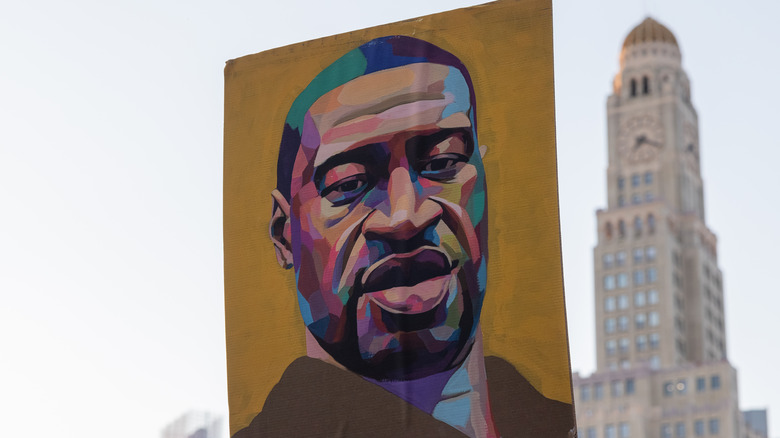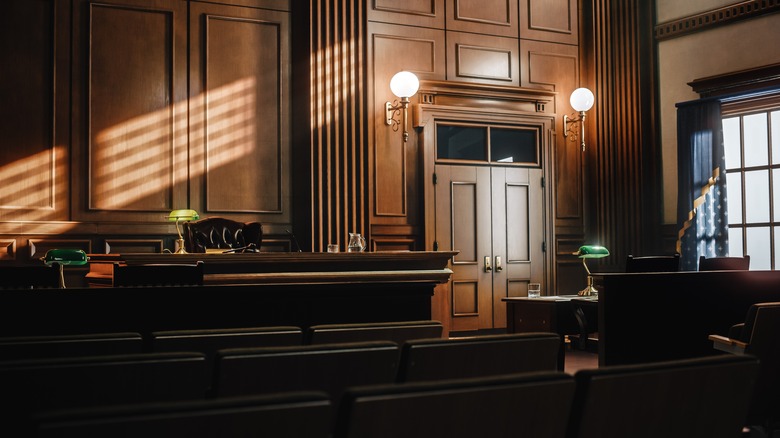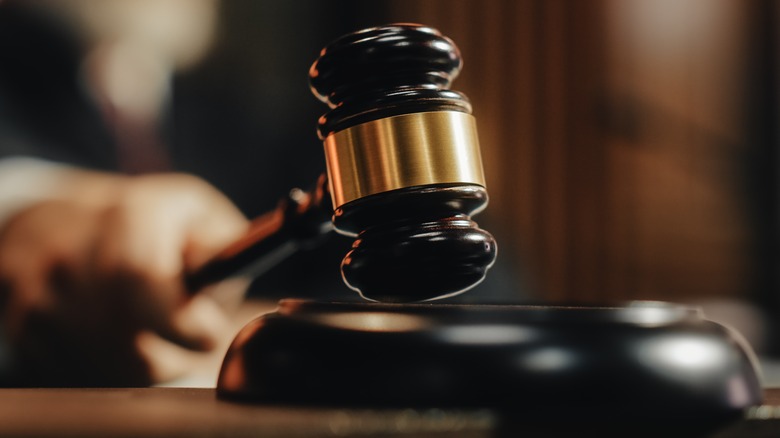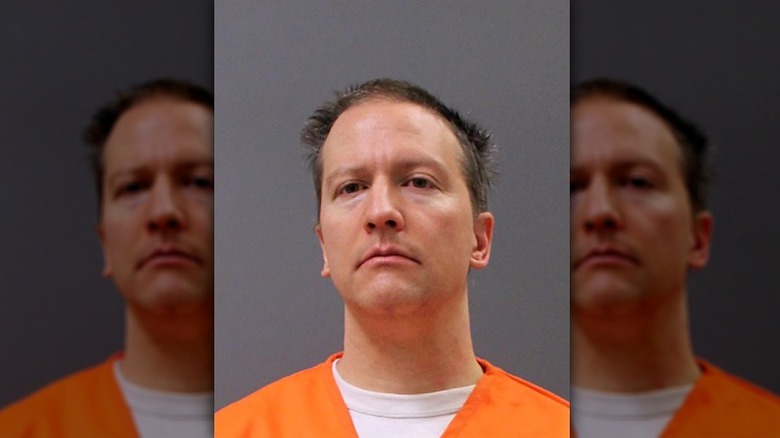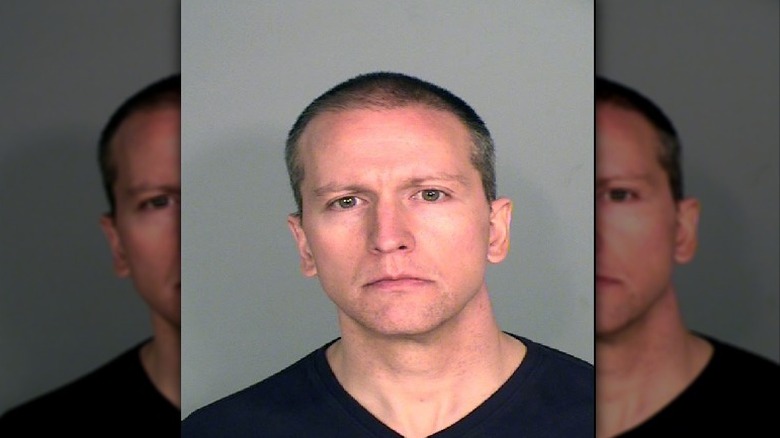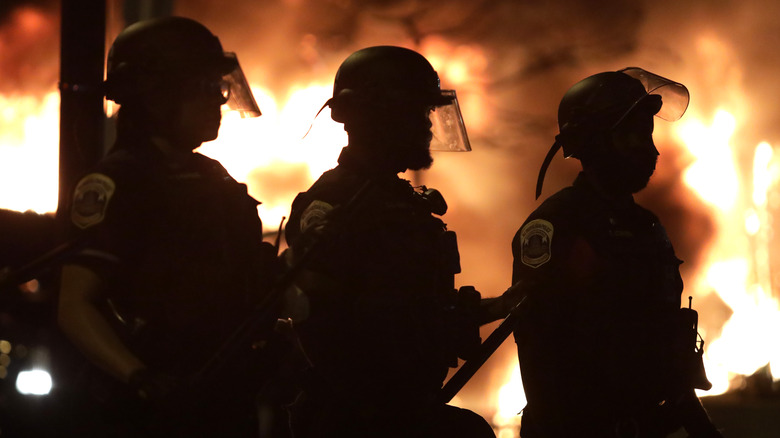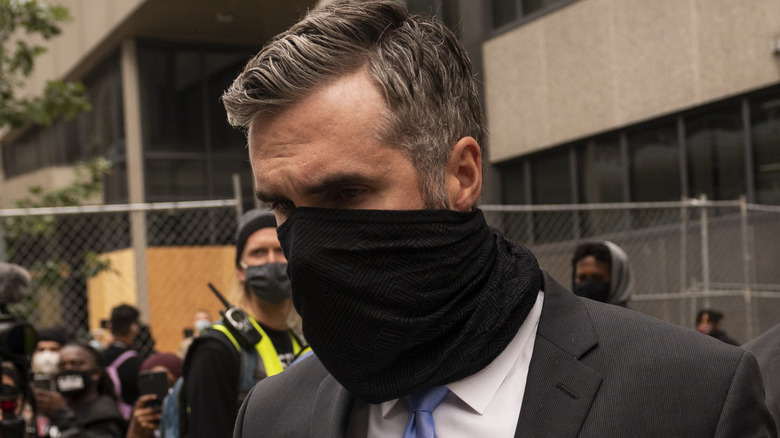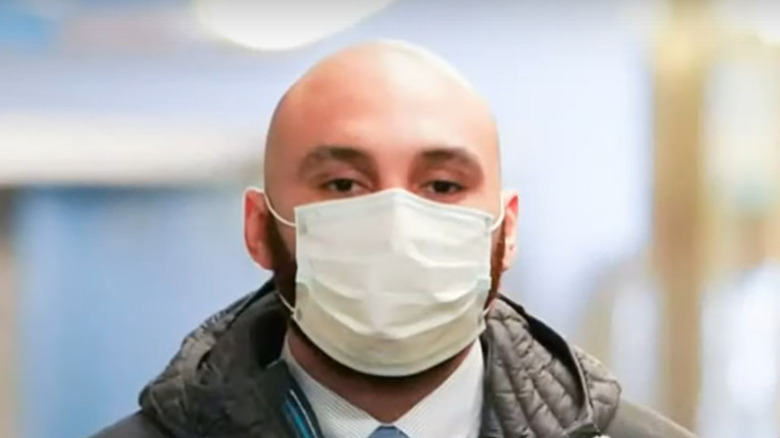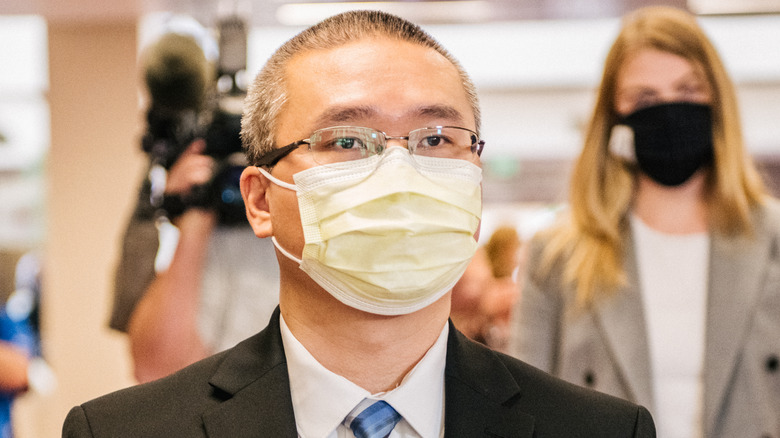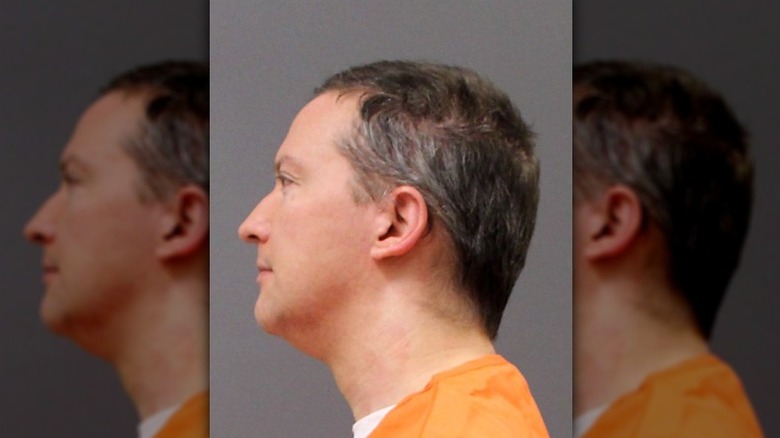Every Verdict And Plea Deal In The George Floyd Murder Case Explained
No one involved in the arrest and death of George Floyd on May 25, 2020, could have known beforehand what an impact the incident would have on the United States and the world. But when officer Derek Chauvin knelt on Floyd's neck for 9 ½ minutes and killed him — despite bystander protest and Floyd's own pleas of being unable to breathe — public outrage snowballed.
In their timeline of the events following Floyd's death, AP News noted the firing of the four officers involved, the burning of Minneapolis' 3rd precinct station, a swell of protests nationwide, and incendiary comments by then-president Donald Trump. CBS News reported in 2021 on the international impact of Floyd's death and the resulting protests. As the incident became a global news story, the four officers involved in Floyd's arrest and death were arrested and charged with murder and manslaughter.
Trials and sentencing can be a lengthy process even in the most high-profile cases, and legal proceedings related to Floyd's death had not concluded as of November 2022, when there was still an outstanding appeal for one officer (per NPR). Another had yet to receive sentencing, and another will face a bench trial (per NPR). But some verdicts have been handed down, and some plea deals have been negotiated. Here is your guide to every ruling, verdict, and plea connected to Floyd's tragic death.
The judge initially ruled that all four officers be tried together
According to AP News, the four police officers involved with George Floyd's death were fired from the Minneapolis police department on May 26, 2020, after a video that bystanders took of Floyd's arrest contradicted the department's account. The mayor of the city called for charges against officer Derek Chauvin the next day, and Chauvin was arrested and charged with murder and manslaughter by May 29. Charges of aiding and abetting were filed against the other three officers on June 3 by state attorney general Keith Ellison.
In November 2020, Peter Cahill, the judge responsible for overseeing the state trials of the four officers, initially ruled that the four men would be tried together, per CNN. He reasoned that a single trial would let any potential jury have a "complete picture" of the events around Floyd's death and that the United States could "absorb the verdicts" of such a contentious case more easily in one go. Ellison agreed.
By January 2021, however, Cahill reconsidered. Per local news station KARE 11, he issued a second ruling separating the trial of Chauvin from that of the other officers. The reason given was that limited space, even in Hennepin County's largest courtroom, meant that a trial for four defendants couldn't comply with COVID-19 safety restrictions. Ellison objected in a statement, but the ruling stood.
A request to move the trial was denied
Even if George Floyd's death had been only a national news story instead of a global one, the trial of the officers charged with his murder would still have attracted publicity. As public protests continued and political figures continued to weigh in throughout 2020, the impact of such attention on potential jurors became a concern.
In November of that year, the defense attorneys for the four officers asked to have the trial moved out of Hennepin County, Minnesota, where the city of Minneapolis lies. Citing the example of the hearings for the September 11 terrorist attacks (per AP News), the defense argued that the defendants and their counsel could be subject to intimidation and threats by protestors and that the presence of a crowd so invested in the trial could influence the decision of a jury.
Ruling on the request, Judge Peter Cahill rejected that logic. He noted that the jurors' names would be kept confidential and the jury fully sequestered, helping to safeguard against outside influences. No part of Minnesota, he noted, was free from the coverage the case had received, and a change of venue would therefore not materially affect media influence. Cahill said he was willing to reconsider the ruling if circumstances suggested it was necessary, but as of November 2022, all rulings and verdicts in the case had come from Hennepin County.
The judge rejected the claim that a settlement should lead to a delay
In March 2021, NBC News reported that the city of Minneapolis reached a settlement with George Floyd's family, who had brought a civil lawsuit against the city and the officers charged with his death. The family filed the suit in July 2020, complaining of a host of issues, including police de-escalation training that led to the use of a violent neck restraint on Floyd. To avoid a trial, the city council unanimously approved $27 million to be paid to the Floyd family, including a $500,000 donation to the area where Floyd died, which has since been renamed George Floyd Square.
In the wake of the settlement, defense attorneys for former police officer Derek Chauvin argued that his trial should either be delayed or moved out of Hennepin County — again requesting a change of venue (per the AP News). The defense maintained that the settlement added to the publicity surrounding the case and posed a potential risk to Chauvin's receiving a fair trial.
Judge Peter Cahill acknowledged that the timing of the settlement was "unfortunate" for Chauvin, but he ruled against moving the trial or stopping it. He said that there was nowhere in Minnesota that wouldn't feel the impact of media coverage about the settlement and Floyd's death, and that a delay in the trial wouldn't blunt the problem posed by publicity.
Derek Chauvin: second-degree murder, third-degree murder, and manslaughter
The officer who put his knee on George Floyd's neck, Derek Chauvin, was arrested on May 29, 2020, and initially charged with third-degree murder and manslaughter, according to NBC News. Under U.S. law, writes lawyer Aaron Larson (via Expert Law), manslaughter is considered an action that results in death without the perpetrator's intent. Third-degree murder, a charge that only exists in two other states besides Minnesota, is an act intended to cause nonfatal harm that results in death (per legal resource Lawrina).
By June, prosecutors had opted to expand the charges against Chauvin. The new accusation held that he was guilty of unintentional second-degree murder, which is a more severe charge. The upgraded charge carried a maximum sentence of 40 years, whereas his initial charge for third-degree murder carried 25.
According to the Star Tribune, jury selection for Chauvin's trial began on March 8, 2021. Legal arguments and eyewitness accounts were heard over 14 days. before the jury reached the verdict of guilty on all three counts on April 20. Judge Peter Cahill thanked them for performing their legal duty under arduous circumstances and, after a few months delay, pronounced the sentence. Per NPR, Chauvin was sentenced to 22 ½ years in prison, falling between the state minimum and the prosecutor's desire for 30 years. The 199 days Chauvin served prior to sentencing were subtracted from his time.
Derek Chauvin pleaded guilty to violating George Floyd's civil rights
The murder and manslaughter charges brought against Derek Chauvin and the other officers implicated in George Floyd's death were state charges. But while awaiting sentencing in May 2021, Chauvin was served a federal indictment for violating Floyd's civil rights (per the AP News). The indictment named three counts: violation of the "right to be free from unreasonable seizure," violation of the right to be free from "unreasonable force" exercised by an officer of the law, and denial of needed medical care. Chauvin was also dealt a second indictment stemming from his use of a neck restraint similar to that used on Floyd against a 14-year-old in 2017.
While Chauvin's attorneys initially maintained that he used reasonable force and that Floyd died of ill health and drug use, the federal charges raised the stakes for Chauvin considerably. If convicted, he faced up to a lifetime behind bars. In December 2021, per AP News, Chauvin changed his plea in court and pleaded guilty to the count of unreasonable seizure and to the 2017 incident, with the other count related to Floyd dropped. As part of the agreement, his possible sentence on federal charges was between 20 and 25 years, and in July 2022 (per the Department of Justice), he was given 21 years in prison, with credit for time already served.
Tou Thao, J. Alexander Kueng, and Thomas Lane: violating George Floyd's civil rights
The federal indictment that charged officer Derek Chauvin with three counts of violating George Floyd's civil rights included the other three officers implicated in Floyd's death. According to AP News, Tou Thao and J. Alexander Kueng were charged with violating the right to be free from unreasonable seizure when they made no effort to stop Chauvin's conduct during Floyd's arrest. The fourth officer, Thomas Lane, was left out of that charge. While no reason was explicitly given, there was evidence introduced in the state-level trial that he had asked about moving Floyd more than once. Still, all four officers were charged with denying Floyd needed medical care.
The indictments were handed down in May 2021, but verdicts wouldn't come until February of the following year. As reported by AP News, the defense argued that the three officers assisting Chauvin had insufficient experience and training and were distracted by the upset crowd during Floyd's arrest. Kueng and Lang were considered rookie cops, and they had Chauvin and Thao sent to help them when they responded to the call that led to Floyd's arrest. In addition to being found guilty of withholding medical care from Floyd, Thao and Kueng were also found guilty of not intervening when Chauvin knelt on Floyd's neck. Per AP News, Lane was given 2 ½ years on his charge, Kueng was given three, and Thao was given 3 ½ years.
Thomas Lane pleaded guilty to aiding and abetting second-degree manslaughter
While Derek Chauvin was the only officer involved with George Floyd's death to face murder charges from the state of Minnesota, the officers assisting him weren't absolved of culpability. Former police officer Thomas Lane, who held Floyd's legs during his arrest, was charged with aiding and abetting manslaughter and aiding and abetting second-degree murder (per AP News). Unlike the other officers in the George Floyd case, Lane was considered less responsible for Floyd's death than the other officers, even in the prosecution's eyes. He asked twice whether Floyd should be moved to help his breathing.
Despite these actions, Lane was still considered to have aided Chauvin in killing Floyd, and he was still convicted on federal charges of violating Floyd's civil rights. He had already received a 2 ½ year sentence on that conviction when he entered a plea deal over the state charges in May 2022. He admitted to placing Floyd in a restraint he knew carried unreasonable risks and pleaded guilty to the charge of aiding manslaughter in exchange for the charge of aiding murder being dropped.
Judge Peter Cahill commended Lane for accepting responsibility for his part in Floyd's death upon receiving the plea deal. He sentenced Lane to 3 years on September 21. There was a brief flash of anger in the courtroom when Lane misunderstood standard legal language and mistakenly thought he would have to register as a predatory offender, but it passed.
J. Alexander Kueng pleaded guilty to aiding and abetting second-degree manslaughter
After Thomas Lane pleaded guilty, ex-officers Tou Thao and J. Alexander Kueng were still scheduled to go to trial together on charges of aiding and abetting unintentional second-degree murder and aiding and abetting manslaughter. During the arrest of George Floyd, Kueng knelt on his back while Derek Chauvin knelt on his neck (per AP News). Kueng and Thao had already been convicted and sentenced to three and 3 ½ year prison terms, respectively, for violating Floyd's civil rights when their state trial was scheduled to begin, according to CNN.
The day jury selection for that trial was meant to commence — October 24, 2022 — Kueng reversed course on his defense. He had, up to that point, refused plea deals offered to him by the prosecution and maintained his innocence. Through defense attorney Thomas Plunkett, Kueng agreed that day to plead guilty to the manslaughter charge if the murder charge was dropped. Per Minnesota Public Radio, Kueng stated in the agreement that he should have been aware of the dangers faced by Floyd due to his training and that he had heard Floyd say he couldn't breathe.
As of November 2022, Kueng had yet to receive his sentence from his plea deal. Judge Peter Cahill said in the October 24 hearing (via CNN) that he would not pronounce a sentence before January 24, 2023. Whatever time Kueng receives, he will serve it concurrently with his three-year sentence for civil rights violations.
Tou Thao negotiated a bench trial
Perhaps the most unusual legal development in the George Floyd murder case is that of officer Tou Thao. Like Thomas Lane and J. Alexander Kueng, Thao was convicted on federal charges of violating Floyd's civil rights and faced state charges of aiding and abetting unintentional second-degree murder and aiding and abetting manslaughter. Thao was the only officer involved in Floyd's death who never touched him. Rather, as NPR notes, he was responsible for holding back bystanders.
Ahead of jury selection for their state trial, Thao saw both his co-defendants enter into plea deals with the prosecution. Instead of following suit, on October 24, 2022, Thao waived his right to a trial by jury and opted for what is known as a bench trial, or a trial by a judge. Under the terms of that agreement, Thao continued to plead not guilty to the manslaughter charges, while the prosecution agreed to withhold the murder charges. If Judge Peter Cahill were to convict Thao of aiding manslaughter, the charge of aiding murder will be dropped altogether.
There is no need for additional eyewitness testimony in Thao's bench trial. Rather, after lawyers for both sides present arguments to Cahill, he will have 90 days to render a verdict. Thao's sentence, in the event of a conviction, will likely be around 48 months and may be served concurrently with his 3 ½ year term for civil rights violations.
Derek Chauvin appealed his conviction
On April 27, 2022, Derek Chauvin filed an appeal to overturn the jury's verdict in his case from the prior year, reports NPR. The appeal alleged that Chauvin did not receive a fair trial due to "prosecutorial misconduct," improper handling of witnesses, and the intimidation of the jury. He echoed arguments made before the trial began that the venue should have been moved in light of the intense publicity centered on Minneapolis. Additionally, he claimed that Judge Peter Cahill incorrectly applied sentencing guidelines when he included "abuse of a position of authority" as a relevant factor in George Floyd's death.
Chauvin's appeal requests one of three things: the conviction be overturned and the case returned to Hennepin County, a new trial be hosted in a different place, or his sentence reduced. The state of Minnesota filed a brief in response to the appeal on September 7 (per the Minnesota Judicial Branch), rejecting its arguments, challenging all three courses of action requested, and explicitly accusing Chauvin of trying to claim that officers of the law can't be convicted of assault. As of November 2022, the Minnesota Court of Appeals has yet to make a decision on the matter.
